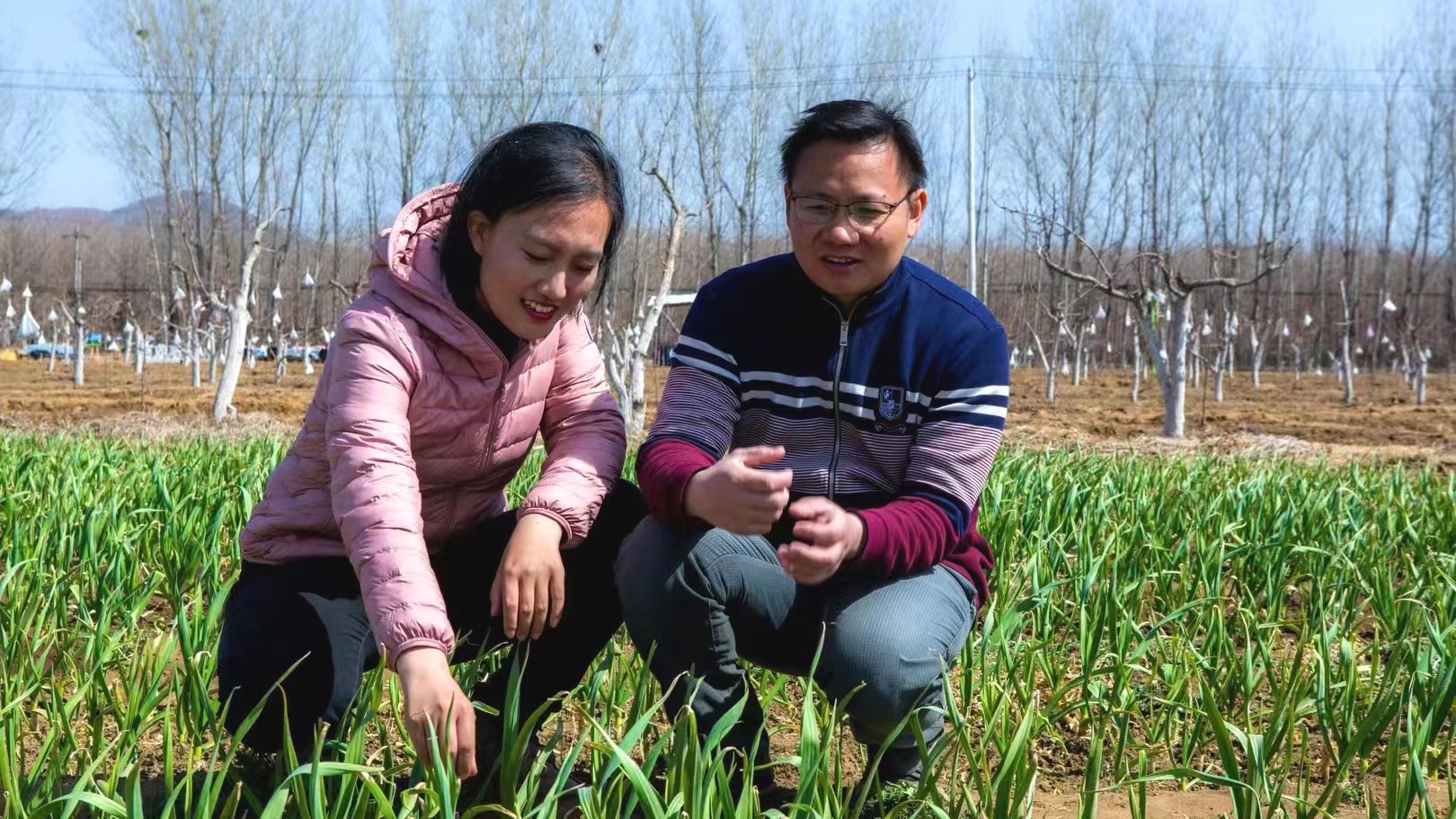
Shi Yan and her husband Cheng Cunwang at the Shared Harvest farm in Liuzhuanghu village, Shunyi District, Beijing, China, March 30, 2023. Both Shi and Cheng hold doctoral degrees in agriculture and promote ecological agriculture in China. /Alumni Association of Renmin University of China
Shi Yan and her husband Cheng Cunwang at the Shared Harvest farm in Liuzhuanghu village, Shunyi District, Beijing, China, March 30, 2023. Both Shi and Cheng hold doctoral degrees in agriculture and promote ecological agriculture in China. /Alumni Association of Renmin University of China
In April, the planting season starts on an ecological farm in a northeastern hamlet of Beijing.
Being ecological, the farm doesn't use chemical fertilizers, herbicides and pesticides, reducing pollution and carbon emissions as much as possible during production.
The farm's owner Shi Yan, 41, has been promoting ecological farming in China for over a decade. She has just finished the 44th training program for "new farmers" who want to run ecological farms like Shi.
"In the past century, some agricultural production methods have had a negative impact on the environment and people's health," she said, adding that it is why so many people are interested in ecological agriculture at present, which could make some positive changes.
To advance green development in the agricultural sector, China aims to build 1,000 national ecological farms and 10,000 at the local level across the nation by 2025, according to the Ministry of Agriculture and Rural Affairs. Last year, Shi's farm has been recognized as one of the national-level farms.
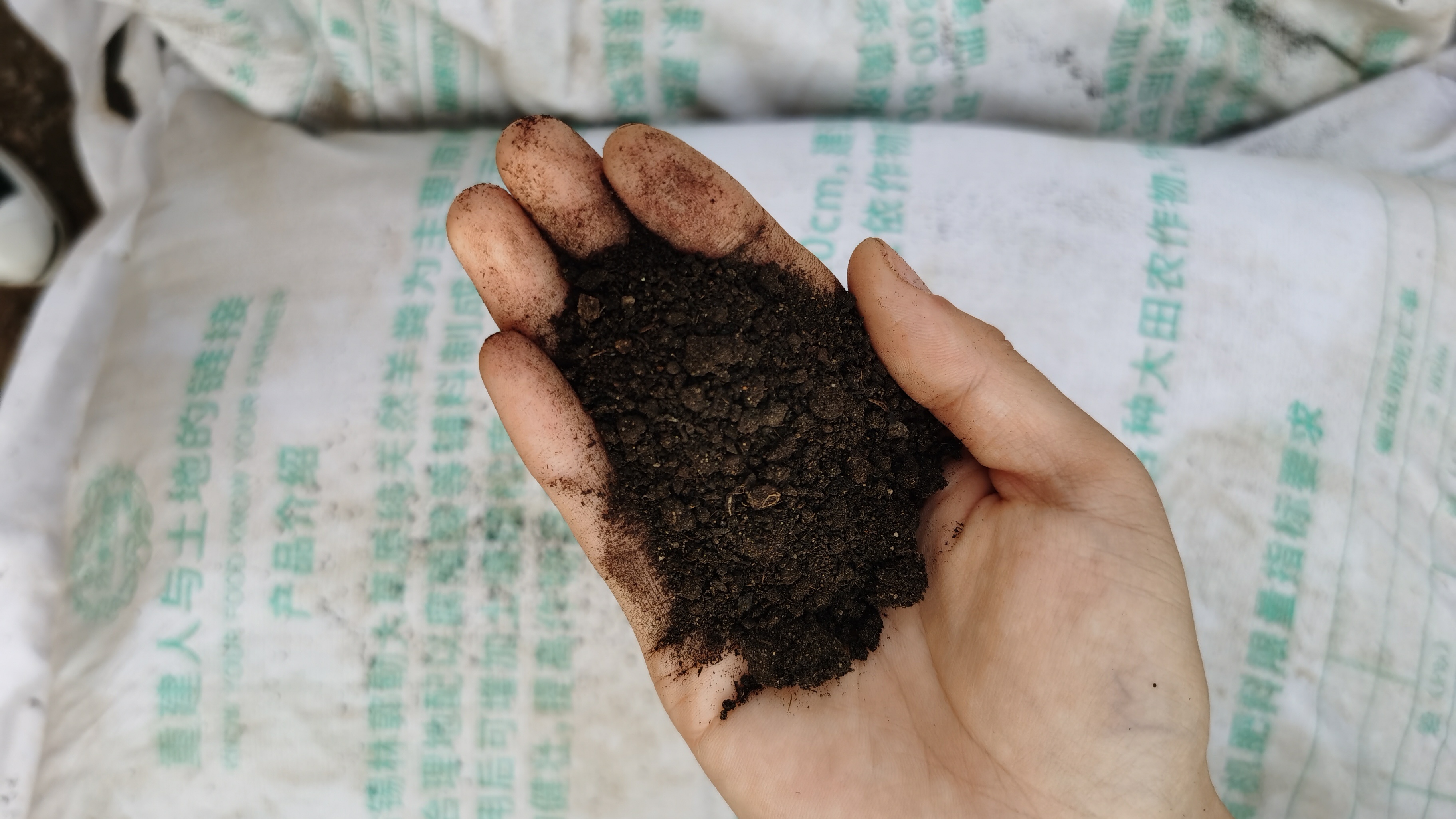
Odorless organic fertilizer used on the Shared Harvest farm, Beijing, China, March 28, 2023. /CGTN
Odorless organic fertilizer used on the Shared Harvest farm, Beijing, China, March 28, 2023. /CGTN
Shi has been heavily reported during the past decade for being a "farmer" who holds a doctoral degree in agriculture. Her passion for ecological farming was kindled back in 2008 when she first experienced community-supported agriculture (CSA) in the United States.
With CSA, farmers and a community of individuals provide mutual support and share the risks and benefits of a farm's operation. Farmers promise to produce agricultural products without using chemicals, and community members enjoy the supply of fresh, safe food from the farm.
Originating in Japan and Europe in the 1960s, it became trendy among environmentally conscious American farmers in the 1980s.
Shi first piloted CSA in the Little Donkey farm in northwestern Beijing, and later established the Shared Harvest farm in 2012. Shi's farm now has three bases in suburban Beijing, occupying over 23 hectares, and most of its community members live in the capital.
Members pay beforehand and use the money to buy products from the farm through its application, ranging from fruits, vegetables and grains, to eggs, meat and other food.
A growing circle
"Vegetables and fruits, put in paper bags and recycled cardboard boxes, are delivered to our customers' door after they placed orders online," introduced Zhang Tong, who joined Shi's team in 2020 after graduating from Tianjin Agricultural University.
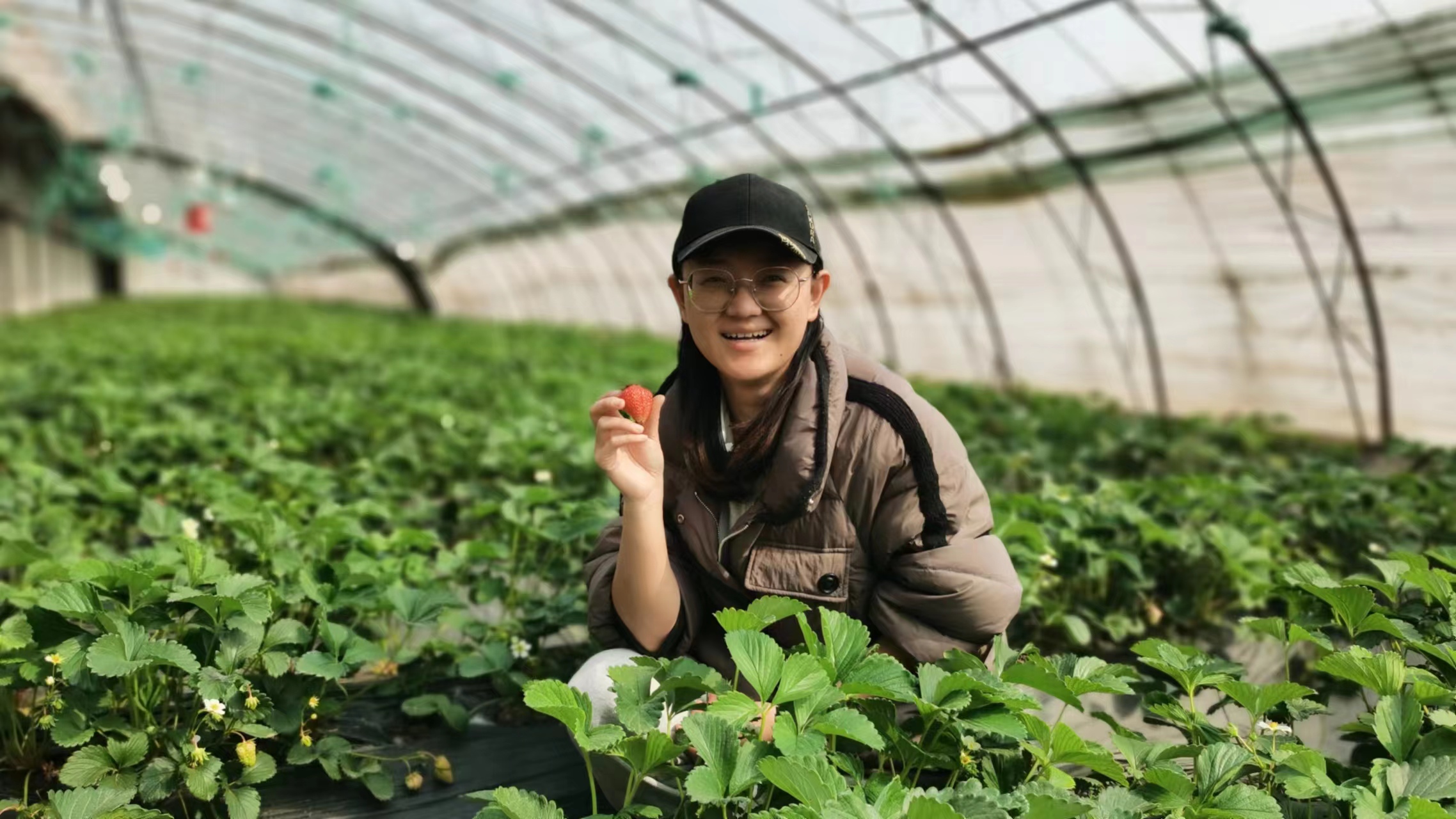
Zhang Tong in a strawberry greenhouse of the farm, Beijing, China, March 28, 2023. /CGTN
Zhang Tong in a strawberry greenhouse of the farm, Beijing, China, March 28, 2023. /CGTN
She has been impressed by the variety of insects found on the farm such as bees, fireflies and earthworms all of which are constant reminders of a healthy agricultural ecosystem.
"I like the people here, and I found inner peace while working on this thriving farm," said Zhang.
The 28-year-old dreams of going back to her hometown one day and building her own ecological farm in Chifeng, in north China's Inner Mongolia Autonomous Region. She could make full use of her work experience on this farm and be closer to her parents who have large plots of farmland in the countryside.
"But most of my university classmates don't work in the agricultural sector," Zhang added.
Most people in China's ecological farming were in their 40s and 50s in 2019, but this community is getting younger according to a survey conducted by Shi in 2022.
Among the 80 staff members working for the Shared Harvest farm, nearly 40 percent are in their 20s and 30s.
"In the early stage, some young people left our farm after one or two years due to low income or dim career prospects, but now we have employees who have worked here for six years," said Shi, who has positioned her farm as a training camp for young talent.
"It takes courage for young people to run their own ecological farms. If they choose to do so after working on our farm, it means they believe in ecological farming and learned something useful in the process," Shi added.
Over 1,200 people have participated in Shi's "new farmer" training sessions and over 300 of them have started their agricultural businesses. Through these gatherings, trainees could bond with a larger community of ecological agriculture in China.
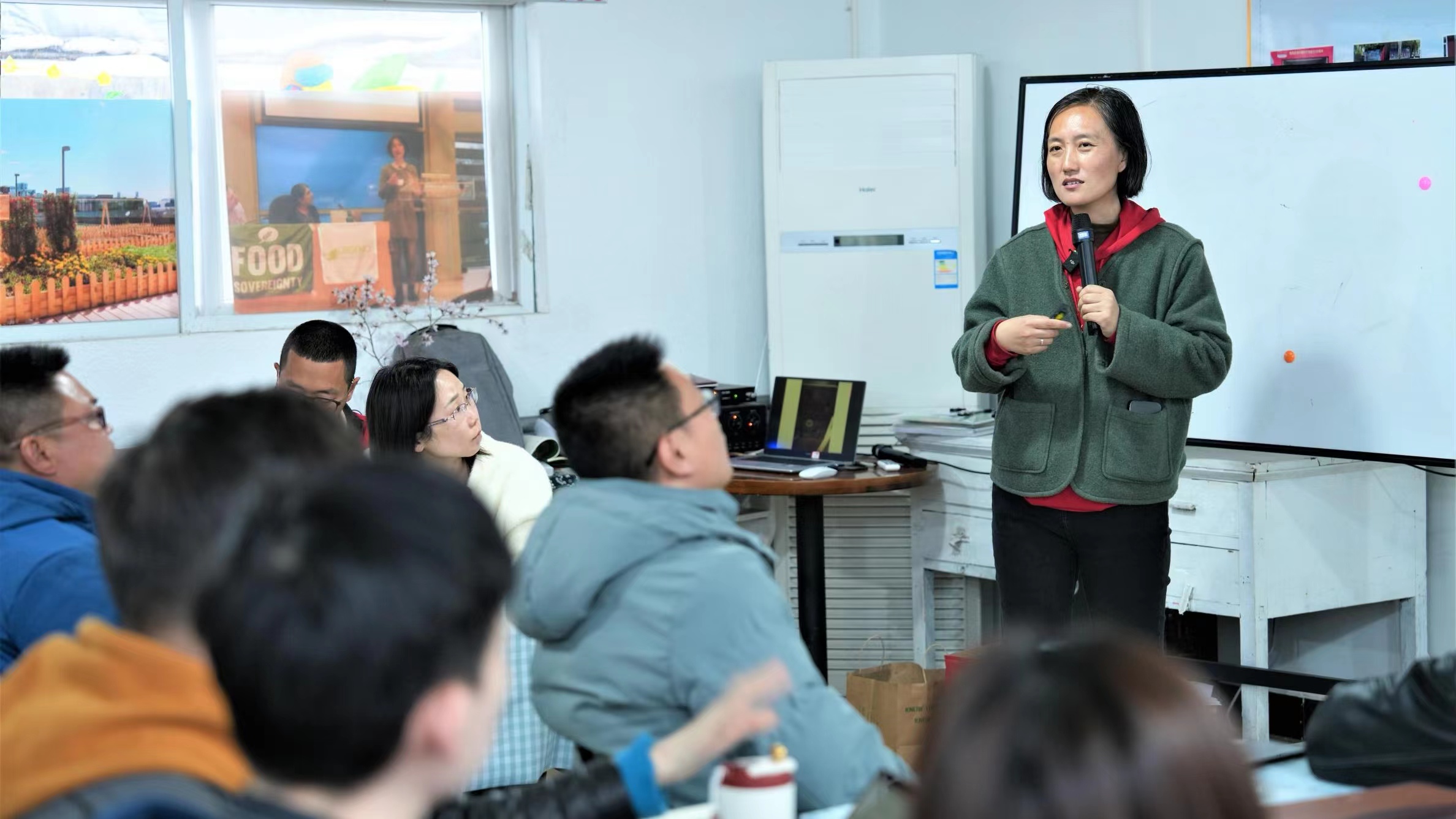
Shi Yan and trainees during the farm's 44th "new farmer" training session, Beijing, China, March 21, 2023. /Shared Harvest
Shi Yan and trainees during the farm's 44th "new farmer" training session, Beijing, China, March 21, 2023. /Shared Harvest
An innovative return
Shi said ecological agriculture is not new in China but rather deeply rooted in the country's thousands of years of agricultural civilization.
"In the days when Chinese farmers didn't use chemicals in rice paddies, they could harvest not only rice, but also ducks, fish and snails," she said.
Consumers welcome pesticide-free agricultural products, but there are concerns about whether the lack of chemical fertilizers and pesticides will result in reduced crop yields.
Shi said ecological agriculture takes into account the total yield of diverse crops and animals that grow together on a plot of land, rather than a single kind of crop.
"A healthy agricultural ecosystem is the foundation of sustainable production," she said.
Moreover, the aim of modern-day ecological farming is not a simple return to traditional farming. Shi calls for an integration of three industries around the eco-farm, specifically farming, food processing, and other services.
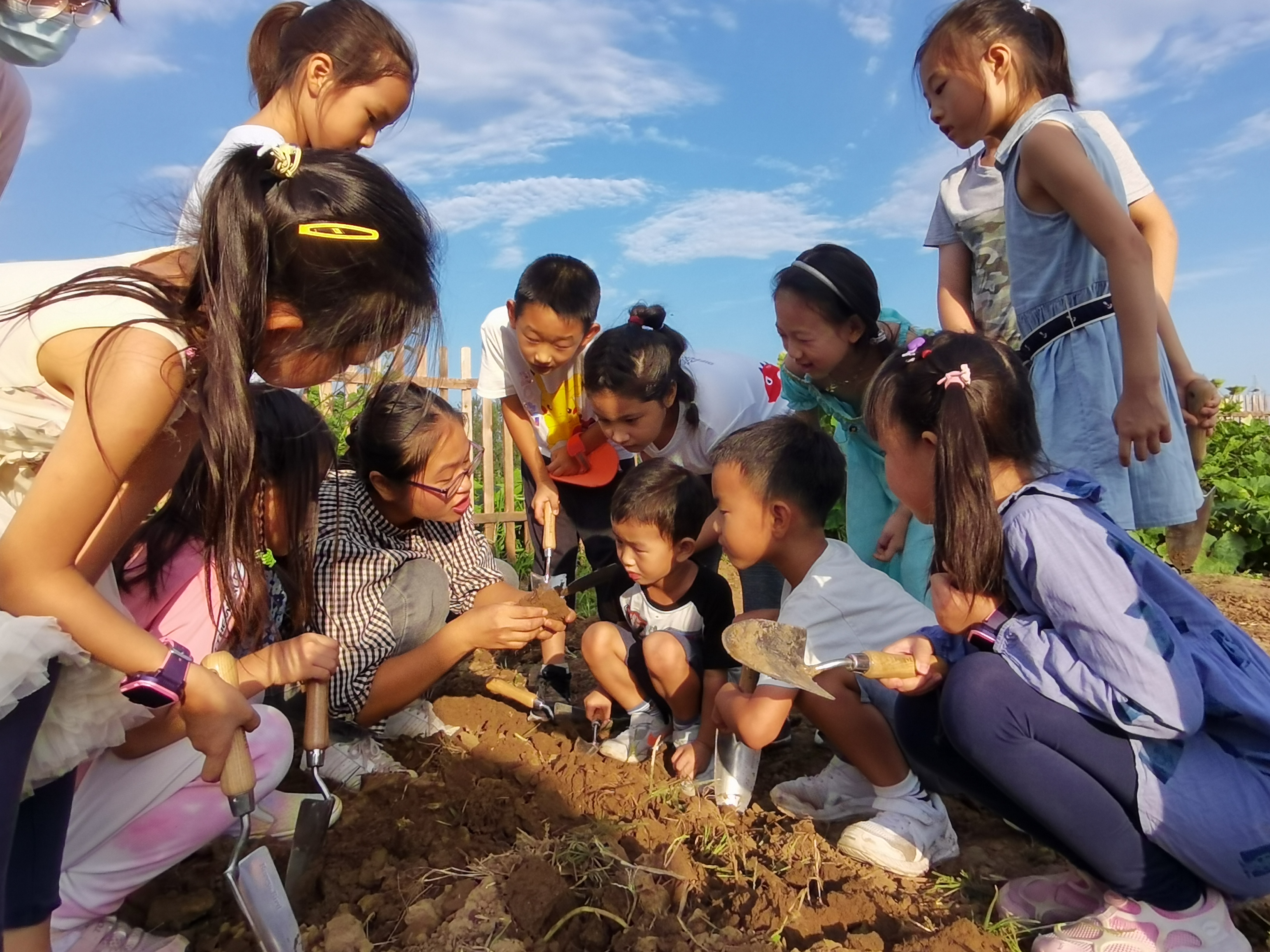
A young employee of the farm Wang Chunhua explains knowledge of soil for children who come from downtown Beijing during a field activity, Beijing, China, June, 2022. /Shared Harvest
A young employee of the farm Wang Chunhua explains knowledge of soil for children who come from downtown Beijing during a field activity, Beijing, China, June, 2022. /Shared Harvest
Shi is considering deepening cooperation with the Liuzhuanghu village where two of her farm bases locate. The village can provide guest houses and tourist spots for the urban dwellers who come to the farm to experience farming activities.
"An ecological farm's success is quite likely to have a positive spillover into the village's momentum," said Shi.
Shi's perception in rural development has attracted two village heads from central China's Hunan Province, and they agreed to make their villages pilot areas for the model centered around ecological agriculture.
Shi stated that the development of ecological agriculture requires not only producers to have systemic technical know-how, but also consumer recognition and trust. She longs for the day when everyone can eat safely and humans and nature can coexist in peace.